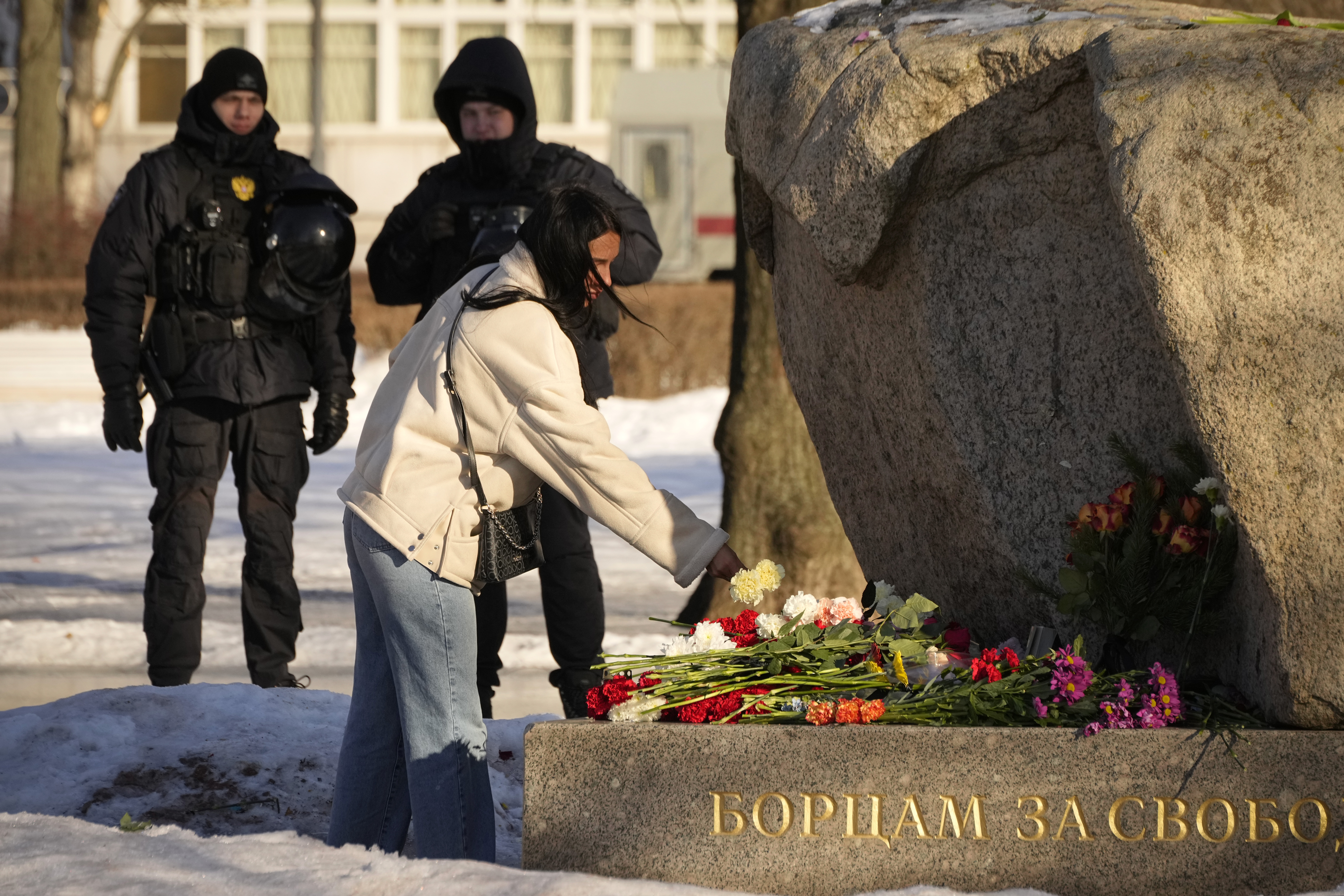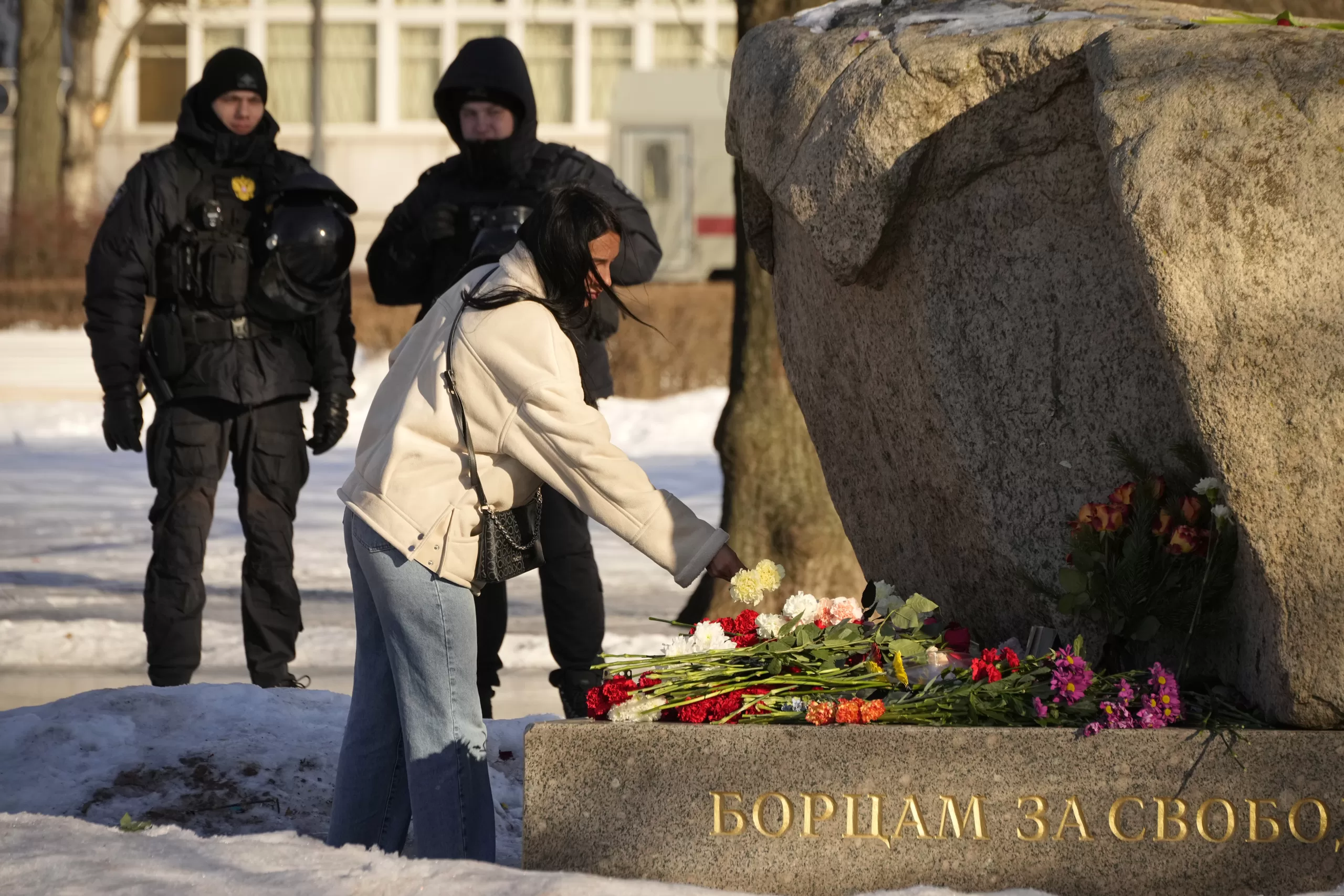
Other politicians took a more cautious stance. Brazilian President Luiz Inácio Lula da Silva said Sunday that he wouldn’t “jump to conclusions” over Navalny’s death. “If the death is under suspicion, we must first carry out an investigation to find out what the citizen (Navalny) died of,” Lula said in a press conference after returning from an African Union summit in Ethiopia on Sunday.
Meanwhile, Navalny’s wife, Yulia Navalnaya, published a picture of the couple on Instagram Sunday in her first social media post since her husband’s death. The caption read simply: “I love you.”
Hundreds of people in dozens of Russian cities streamed to ad-hoc memorials and monuments to victims of political repression with flowers and candles on Friday and Saturday to pay tribute to the politician. In 39 cities, police detained 366 people by Sunday evening, according to the OVD-Info rights group that tracks political arrests and provides legal aid. Earlier in the weekend, the group reported 401 detentions in two days, but later updated the number and said that their count “may change both up and down over the next few days” as information is being verified.
More than 200 arrests were made in St. Petersburg, Russia’s second-largest city, the group said. By Sunday evening, court officials in St. Petersburg reported rulings ordering 154 of those detained to serve from one to 14 days in jail.
Among those detained there was Grigory Mikhnov-Voitenko, a priest of the Apostolic Orthodox Church — a religious group independent of the Russian Orthodox Church — who announced plans on social media to hold a memorial service for Navalny and was arrested on Saturday morning outside his home. He was charged with organizing a rally and placed in a holding cell in a police precinct, but was later hospitalized with a stroke, OVD-Info reported.
Memorial events also took place in cities across the world.
In Berlin, members of the Russian activist group Pussy Riot held a demonstration outside of the Russian Embassy, holding banners that read “murderers” in English and Russian.
The group, which included Pussy Riot members Nadya Tolokonnikova and Lusya Shtein, as well as longtime Navalny ally Lyubov Sobol and former Russian state media journalist Marina Ovsyannikova, planned to march with the banner to the city’s Brandenburg Gate but were ultimately stopped by police.
Tolokonnikova told The Associated Press after the demonstration that such actions were meant to show “that we exist.”
“We show ourselves to each other and support each other, and show with this action that Russia still has a future, and the idea of a ‘beautiful Russia of the future’ hasn’t died,” she said, using a term Navalny has famously coined. “Right now (some are) saying that hope died together with Navalny. But it seems to me that with (the death of) Navalny it wasn’t the hope that died, but rather responsibility was born.”
Dozens of people in Romania’s capital of Bucharest also gathered outside the Russian Embassy on Sunday to pay tribute to the opposition leader.
Many lit candles and placed flowers next to a memorial portrait of Navalny, while several people brandished placards that read: “You don’t win free elections by murdering the opposition.”
In Finland, a group of Russian residents gathered signatures for a petition proposing a name change for a park adjacent to the Russian Embassy in the capital, Helsinki, to Navalny Park in honor of the deceased opposition figure.
The news of Navalny’s death came a month before a presidential election in Russia that is widely expected to give Putin another six years in power.
Questions about the cause of death lingered, and it remained unclear when the authorities would release Navalny’s body. More than 29,000 people have submitted requests to the Russian government asking for the politician’s remains to be handed over to his relatives, OVD-Info said Sunday.
Navalny’s team said Saturday that the politician was “murdered” and accused the authorities of deliberately stalling the release of the body. Navalny’s mother and lawyers received contradictory information from various institutions they visited in their quest to retrieve the body.
“Everything there is covered with cameras in the colony. Every step he took was filmed from all angles all these years. Each employee has a video recorder. In two days, there has been not a single video leaked or published. There is no room for uncertainty here,” Navalny’s closest ally and strategist, Leonid Volkov, said Sunday.
Russia’s Federal Penitentiary Service reported that Navalny felt sick after a walk Friday and became unconscious at the penal colony in the town of Kharp, in the Yamalo-Nenets region about 1,900 kilometers (1,200 miles) northeast of Moscow. An ambulance arrived, but he couldn’t be revived, the service said, adding that the cause of death is still “being established.”
Navalny had been jailed since January 2021, when he returned to Moscow after recuperating in Germany from nerve agent poisoning he blamed on the Kremlin. He received three prison terms since his arrest, on a number of charges he has rejected as politically motivated.
